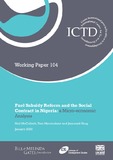| dc.contributor.author | McCulloch, Neil | |
| dc.contributor.author | Moerenhout, Tom | |
| dc.contributor.author | Yang, Joonseok | |
| dc.coverage.spatial | Nigeria | en |
| dc.date.accessioned | 2020-01-24T16:40:31Z | |
| dc.date.available | 2020-01-24T16:40:31Z | |
| dc.date.issued | 2020-01-24 | |
| dc.identifier.citation | McCulloch, N.; Moerenhout, T. and Yang, J. (2020) Fuel Subsidy Reform and the Social Contract in Nigeria: a Micro-economic Analysis, ICTD Working Paper 104, Brighton, IDS | en |
| dc.identifier.isbn | 978-1-78118-608-4 | |
| dc.identifier.uri | https://opendocs.ids.ac.uk/opendocs/handle/20.500.12413/14989 | |
| dc.description.abstract | Fuel subsidies in Nigeria are enormous. At last estimate, the state subsidises petrol to the tune of US$3.9 billion – almost double the entire health budget. Such subsidies come at great cost: the opportunity costs of such spending on other development objectives are large; the distribution of resources to the state governments is reduced; the vast majority of the subsidy goes to better-off Nigerians; and cheaper petrol encourages greater pollution, congestion and climate change. Despite this, most Nigerians oppose the reduction or removal of subsidies. We draw on a new nationally representative household survey that asked Nigerian men and women about their knowledge and attitudes towards subsidies. We construct and test a set of hypotheses about the determinants of support for subsidy reform. We also use a survey experiment to explore how different framings of the issue influence support for reform. We find that different framings of reform are not able to alter Nigerians’ opinion from opposing to supporting reform, indicating deep-rooted beliefs about the role of petrol subsidies in Nigeria’s social contract. We find that people that already pay more than the official price and that have experienced a lack of fuel availability are more likely to support reform. Trust in government is also associated with support for reform, as is delivery of reasonable national and local services, supporting the idea that building the ‘social contract’ is key to reform. Social and personal norms also appear correlated with support for reform. Intriguingly, actual knowledge about subsidies is not – people appear to form their opinions on the issue regardless of their understanding of it. | en |
| dc.language.iso | en | en |
| dc.publisher | IDS | en |
| dc.relation.ispartofseries | ICTD Working Paper;103 | |
| dc.rights.uri | http://creativecommons.org/licenses/by-nc/4.0/ | en |
| dc.subject | Development Policy | en |
| dc.subject | Economic Development | en |
| dc.subject | Governance | en |
| dc.title | Fuel Subsidy Reform and the Social Contract in Nigeria: a Micro-economic Analysis | en |
| dc.type | Series paper (non-IDS) | en |
| dc.rights.holder | © Institute of Development Studies 2020 | en |
| dc.identifier.team | Governance | en |
| rioxxterms.version | VoR | en |


